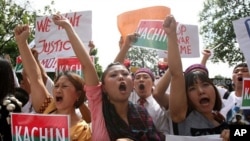Burma has won praise for signing a series of ceasefires with ethnic rebel groups fighting for autonomy. But renewed conflict with one group, the Kachin Independence Army (KIA), is threatening peace in a key border area with China.
Burma’s resource-rich northern Kachin state has been the site of sporadic fighting since June, when a 17-year-old ceasefire ended with violent clashes.
Since then, thousands of villagers have fled across the border into China. To help resolve the situation, Beijing, which has billions invested in regionally-based trade and energy projects, has been quietly hosting peace talks between Burmese authorities and the rebels.
Brian Erikson of Partners in Relief and Development, an international Christian charity with a specific focus on the welfare of Burmese children, estimates that more than 60,000 people were displaced around the border area.
Those inside Burma, he says, are short on food with many are suffering from respiratory infections exacerbated by cold weather.
"There are definitely people numbering in the thousands that have fled from a direct conflict with the Burma army ... direct confrontation where armed soldiers forcibly claimed area, property and sometimes people," said Erikson. "And so people fled amidst live rounds of gunfire - I think the majority have fled from fear of this situation."
International organizations and journalists have been granted limited access to Kachin state, leaving specifics of the situation difficult to verify. Details on the Chinese side, where authorities have not acknowledged any refugee crisis but have provided neutral territory for both sides to hold talks twice since November, are also unclear.
Raviprasad Narayanan, a researcher at Taiwan’s National Chengchi University, says China’s role as host is a result of a similar 2009 conflict between Burma’s military and a Kokan militia in Shan state, which disrupted trade and sent thousands of refugees fleeing into China.
"This new round of interest that Beijing has shown, it emerges out of ... the August 2009 Kokang conflict," said Narayanan. "Now you [have] the refugee crisis on China’s border, and this [has] created a lot of hiccups, not only for the provincial leadership but also for people sitting in Beijing. Hence they felt that they should not be out of [the] loop at any moment lest they be caught off guard."
A financial stake
The continued fighting in Kachin threatens not only peace, but also billions of dollars in Chinese trade and investments.
After hostilities erupted near the construction site of the controversial, $3.5 billion Myitsone hydropower dam, Burmese President Thein Sein suspended construction, surprising and upsetting the Chinese.
Beijing has deals to build seven hydropower dams in Kachin state, with the vast majority of the electricity going to China.
China also buys and invests in Burmese minerals, precious stones and logging - not all of it legal - and, in return, sells cheap manufactured goods.
Aung Kyaw Zaw, a Ruili-based Burma analyst, says China is hosting peace talks to protect its economic interests.
"In the northern Kachin area, especially the KIA controlled area, so [much] government capital, Chinese government capital," he said. "They need peace."
Pipelines, arms deals
Maung Zarni, a visiting fellow at the London School of Economics, says oil and gas pipelines that China and Burma are jointly laying across the country are of even greater importance.
When finished, the pipelines will stretch from Burma’s western coast and into China at Ruili, just south of Kachin state and not far from the recent fighting, providing a strategic alternative route for African and Middle East oil to flow to China while avoiding the piracy-prone Strait of Malacca.
For China, says Zarni, the pipelines make peace between Burmese authorities and Kachin's rebel armies a strategic imperative.
"The Kachin state becomes extremely vital both to the Burmese military and Beijing in terms of ... providing security for the pipeline as well as the cross-border trading post," he said.
Military analysts say China is also the largest supplier of weapons to the United Wa State Army, the largest of Burma's armed rebel groups, estimated at up to 30,000 fighters and considered the biggest narcotics dealing organization in Southeast Asia.
To balance its interests, China also sells weapons to Burma’s military.
Zarni says that, with Burma’s economy opening up, Beijing’s attention is squarely fixed on officials in the capital.
“China, when it suits its interests, will pressure local ethnic armed groups, especially Wa, and you know I think Kachin as well," he said. "But I don’t know to what extent their efforts have been constructive or slanted in favor of the Burmese interests, because, at this point, China is fishing the bigger fish in Naypyidaw rather than fishing along the border with the local ethnic groups."
An end to fighting with the rebels is one of the key demands of Western powers for improving relations with Burma after years of punishing economic sanctions.
The government has so far made deals with, among others, the Wa, the Karenni, the Shan, the Chin, and an historic ceasefire with the Karen, who have fought against Burma’s military for six decades.
China Hosts Burma-Rebel Peace Talks for Economic, Strategic Benefit




